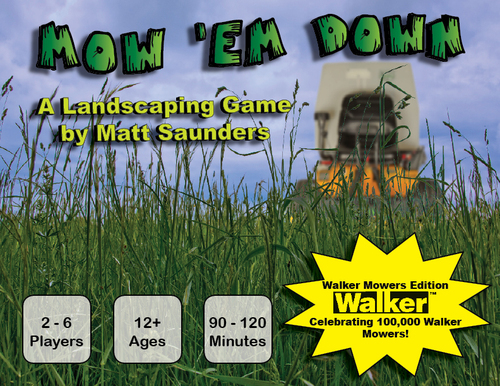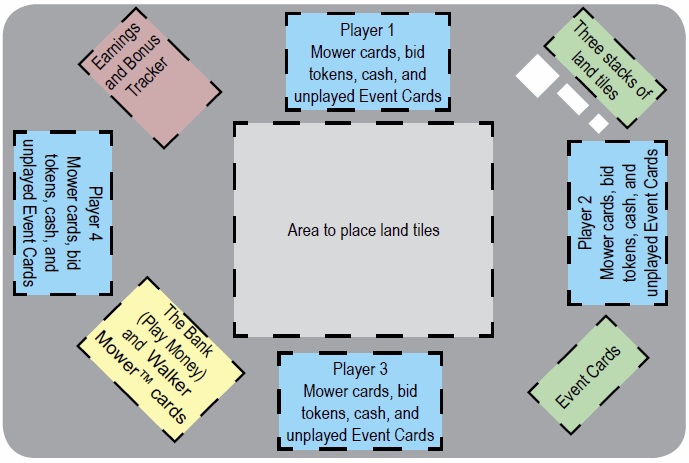
The Basics:
- Ages 12 and up
- Two to six players
- About 90 minutes
Geek Skills:
- Counting & Math
- Logical & Critical Decision Making
- Reading & Writing
- Pattern/Color Matching
- Strategy & Tactics
- Auction, Bidding, & Trading
Learning Curve:
- Child – Hard
- Adult – Easy
Theme & Narrative:
- You are the owner of a landscaping company and must compete for lucrative contracts to become a successful business in a city full of competition.
Endorsements:
- Father Geek approved!
- Child Geek approved!
Overview
In Mow ‘Em Down, each player takes on the role of an entrepreneur who owns a small but potentially very successful landscaping business. There are many opportunities available, but there are other “go getters” who are also looking to take advantage of the city’s growing need for landscaping. Each player will have to carefully manage their resources and do their best to bid on contracts as low as possible to beat out the competition, while as the same time making a profit. The players will need logical and critical decision making skills at the ready and a shrewd sense of business to be competitive!
The game is comprised of 1 scoring board, an assortment of three different sized city tiles, tracking and bid tokens, paper play money in various values, event cards, and mower cards. In addition, the game comes with dry erase markers (one for every player) and a single six-sided die, small pieces of cloth to wipe away the dry erase marker, two numbered tiles (used for auctions), and, of course, the rule book. There is very little “flash” in the game. All of the game components are designed to be useful and durable. The rule book is not only short and to the point, but very easy to read and does an excellent job of explaining the game. This is a welcome change to some of the larger big box games that have very colorful and large rule books that don’t do much to actually explain the game and leave you more confused than ever. The same cannot be said about the rules to this game. It is obvious that much time and energy has gone into designing the game, working out the bugs, and carefully making sure all the hard work is carefully explained.
Game set up is very simple. Take the city tiles, divide them into their three different piles determined by size, shuffle them, and place them face down. Each player is given 22 bid tokens and 3 tracker tokens (in different colors for each player), 2 mower cards, $4000 in paper money, and 1 dry erase marker with a small piece of cloth. The score board is unfolded and set aside where all players can see it. The “Bank”, which contains all the yet unclaimed paper money and is also set aside. Lastly, the event cards are shuffled, placed face down and set aside, too. Each player takes two of their tracking tokens and places them on the starting areas of the score board (explained in greater detail below) and four bid tokens (also explained in further detail below). To save time, elect one player to be the score keeper and one player to be the Banker. You are now ready to play the game.

One example of how you might want to set up your playing space
On a player’s turn, the will complete the following actions in sequential order:
- Receive earnings
- Purchase equipment
- Roll die to determine available city tile
- Build, bid, or boot
Receive Earnings
A player receives paper money in the amount noted on the score board noted on the earnings tracker. This money is taken from the Bank and made immediately available to the player. In addition, a player might also qualify for the Gas Savings Bonus which is only awarded to the player if they have a 3 or more continues (i.e. connected together on at least one side) city tiles that they currently control via a contract. The idea here is that the player is actually saving money on gas because the land they are responsible for is within close proximity of each other.
Purchase Equipment
Each player starts with 2 lawn mowers available to their company. Each lawnmower provides 2 bid tokens, which represents the available area the lawn mower can cover. Once played on the city tiles, the bid tokens are no longer available to the player until they are booted off. In order to compete, a player must continue to grow their company. The more mowers they have the more contracts they can bid on. But a lawn mower isn’t cheap. Each new edition to the player’s “fleet” of equipment will cost them $1200, paid from the player’s paper money. For every new lawn mower purchased, two bid tokens are also provided (1 lawn mower = 2 bid tokens).
At the beginning of the game, each player starts with 2 lawn mowers which means they start with 4 bid tokens. This and the starting paper money is meant to represent the player’s starting company investment and available resources.
Whenever a player buys one or more new lawn mowers, they must also draw one Event card. Event cards can be very beneficial or downright painful. The rules suggest that each player leave a little cash always to the side to handle any unforeseen challenges as the result of a negative Event card. I will go one step further and strongly suggest it. Out of a 20 cards, only half are beneficial. What you can expect to draw from the Event card are real life events that could happen. For example, using too much fertilizer and burning the grass (lose money) or getting a big tip for great work (gain money). If you do not have the money to cover the negative Event cards, it will cost you more in the long run. One card in particular I find very nasty is the bug infestation on all the land you currently have contracts for. Depending on the land size, the money required to kill the bugs is different. Worse yet, if you can’t cover the cost, you only receive half of your earnings at the beginning of your turn until you can pay off the debt!
Word to the wise: save money for a rainy day!
Roll Die to Determine Available City Tile
The single six-sided die is rolled. The value determines to things. First, it determines what size city tile can be placed this round. Second, it determines the lowest and highest bid values allowed if the land is to be bid on for a contract.
- Roll 1 – Small sized land: minimum bid of $100, max of $1000
- Roll 2 – Small sized land: minimum bid of $200, max of $2000
- Roll 3 – Small sized land: minimum bid of $300, max of $3000
- Roll 4 – Medium sized land: minimum bid of $400, max of $4000
- Roll 5 – Medium sized land: minimum bid of $500, max of $5000
- Roll 6 – Large sized land: minimum bid of $600, max of $6000
Once the dice is rolled, set it aside for easy reference for the duration of the player’s turn.
Build, Bid, or Boot
The player must now decide one of the following:
- Build: select the land size that is available based on the die value and place it in the city. Roads must match roads, water must match water, and so on. If the tile placed completes a lake or a grass space, the player receives a one time bonus of $2000 (not tracked on the earnings tracker). Additionally, if there are any active contracts on the city tiles that helped complete the lake or grass, those players receive a one time bonus of $1000 per contract (not per token). This includes the player who is placing the city tile. This rule, while seemingly out of place, is intended to add a subtle metagame of offensive and defensive placing of city tiles, instead of just making it a meaningless act of building the city.
- Bid: select one or two existing city tiles that do not have a contract on them and match the land size made available based on the die value rolled. The player identifies which city tiles are being auctioned and places the #1 and #2 marker on the land. All bids are blind (you cannot see how much the other players are bidding). But before you can even bid, you must have enough bid tokens. The number of bid tokens required is dependent on the land size. Small land only takes 1 bid token for a contract, medium takes 2, and large takes 4. If the player has enough bid tokens, they secretly write a value on one of their tokens using the dry erase maker. The player cannot bid any higher than the maximum and no lower than the minimum. Obviously, the player wants to go as high as possible, but also needs to be the lowest bidder. This makes bidding a very tricky decision! Once everyone reveals their bid, the lowest bidder wins per land marker, places the required number of tokens (including the token with the written bid) on the land to represent a contract, and moves their earnings tracker accordingly on the score board. Additionally, they might now also qualify for the Gas Savings Bonus, but not until it is their turn to receive earnings.
- Boot: select any contract (including the player’s own contracts) and remove them from the city tile. Return the bid tokens to their owner, adjusting the earnings tracker and Gas Savings Bonus as needed. The player must then also draw an Event card. Note that if the player losing the contract has not yet received their first payment, they will be awarded a one time bonus of the bid value. They still lose the money equivalent on the event tracker. Think of this as like a penalty for breaking a contract. Got to love the fine print. The only thing that can save a player from being booted is an Event card that specifically blocks forced removal.
The game ends when one of the three events occur:
- The last city tile is placed
- A player purchases more lawn mowers than they have bid tokens for (buys 12 or more lawn mowers)
- The last lawn mower is purchased
Once the game has ended, each player receives one final payment. The amount of payment is determined by the earnings tracker and the Gas Savings Bonus. Any unresolved Event cards will effect the final payment, too. Each player then counts all their cash and includes an additional $10,000 per mower, unless the game is ending because the last mower has been purchased. The player who purchased the last mower gets $12,000 for it (because it has never been used).
The player with the highest total value wins the game and goes on to retire to in the desert where they never need to mow a single blade of grass again for the rest of their lives. Ah, retirement…
Got it? No? Here’s a video from the game designer, Matt Saunders, that explains in more detail. Or, if you are the “reading type”, you can download the rules (PDF).
Predictions
I am clearly pushing the limits with this game with my six-year-old son. I am eager to teach him the basics of auction mechanics in a way that is meaningful and imaginative. The other auction games I own (Ra and Alhambra, for example) are a bit too abstract and will cause my little geek to spend more time wondering “what” they are doing versus “how” they are playing.
When I read about Mow ‘Em Down, I thought to myself that this was an excellent game that would help me teach my little geeks the basics of auction mechanics with a theme that was meaningful. Meaningful how, you ask? I live on about 3 acres of land and that land needs to be mowed every 2 weeks or so in the summer. I have purchased a riding lawnmower to help me complete the task and my two oldest little geeks (ages 6 and 3), love taking turns helping me drive. They have a blast and I am secretly getting them to associate mowing the grass as something “fun”. This game will only further strengthen that association! Bwahahahahahahaha!
My prediction is that my oldest little geek will like it, but he will be overwhelmed. I have replaced the paper money with poker chips and made the values 1, 2, and 3 for easier counting (reducing the earning tracker values by 100). Expecting to have my little geek keep track of money in the thousands just isn’t realistic at this time.
Everything else in the game is as listed in the rules. The end result will be, I hope, a great game that will introduce some new concepts to my little geek and get him excited for more!
Final Word
I really like this game, not because of its game mechanics (which are easy to grasp and fun to play) but because of what it is about. I have played just about every auction game around and have bid on planets to works of art, contracts for ship building and large quantities of cocoa. What is missing from all of these is a sense of realism, if you will. Yes, yes, I know. Games are always meant to “simulate” an experience, but sometimes it is fun to play a game where the actions you are taking are the very same actions you would take in real life. In fact, I’d argue that such a game is actually a great experience to teach the young and old alike using real world scenarios with real world rewards and consequences. Lots of auction games have some of this, but Mow ‘Em Down provides a refreshing take on an otherwise completely mundane theme. Who knew it would be so much fun to start a landscaping company? Not I, for certain.
My oldest little geek had a hard time playing this game. Not because the game itself is complex, but because there is a lot to think about. The subtle questions you must ask yourself can only be done if you are grasping the finer points of the auction mechanic. My son had no problems grasping the tile placement and understanding the Event cards. And you should have seen how terribly excited he was when it came to booting me off contracts! But all of these are means to an end, and it is the end game itself my son had a hard time grasping. This is one of those skills that cannot be taught except through trial, error, and many hours at the gaming table. In truth, it is a skill I struggle with from time to time, both at the gaming table and away from it. Keeping our eye on the end goal and understanding all the different ways you can get there can be a worrisome and overwhelming task. Still, I am very pleased with my son’s performance and see great promise.
In summary, this is a great game. The suggested age range is right on the money. I played it with my oldest little geek (age 6) but there was a lot of help from me to keep him going. This is a not a terribly complex game, which makes Mow ‘Em Down an excellent medium to teach the auction mechanic to new players using a theme that is not abstract or far fetched. For a small press game, Mow ‘Em Down is an outstanding release. The game mechanics and theme combine to deliver an entertaining and challenging experience. Do give it a try! You can purchase the game directly from the game publisher and designer for less than it would take to currently fill a lawn mower’s gas tank (a sad commentary on today’s economy if ever there was one).
This game was given to Father Geek as a review copy. Father Geek was not paid, bribed, wined, dined, or threatened in vain hopes of influencing this review. Such is the statuesque and legendary integrity of Father Geek.
Discover more from Father Geek
Subscribe to get the latest posts sent to your email.






Great review! Who knew a game about landscaping would be fun? 🙂 I would love to win this!
Pingback: Father Geek Spotlight: Matt Saunders » Father Geek
This game looks like a blast and I would love to play it with my nephews 5 and 7 years old. They are currently watching a pool be installed in their back yard. This game would be great fun and a great learning tool for them too!!!
Pingback: Father Geek » Orbit: Rocket Race 5000 Game Review
Pingback: Father Geek » Mow Money Print-and-Play Game Review